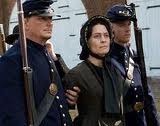When you see this movie, you will give thanks that you live now, when the rougher edges of the English Common Law have been smoothed away. The harsh edges are not all the way gone, of course. Mark Twain could still do a satirical number on us, but justice, freedom, and equality before the law have advanced over the past couple of hundred years.
You will give thanks that you live in a time where jury-of-her-peers has substance, where a free press wouldn’t tolerate for one moment the injustice depicted in this film, where the perpetrators of this show trial would lose their license to practice, their offices, and their pensions.
Your contemplations might even lead you to question your adamancy about the death penalty in an age when DNA disproves today what we knew for certain yesterday, and when Supermax is surely close enough to taking a life to count, with the added benefit that a murderer has time to repent.
If I ever pass the Bar, and if I ever become a criminal defense attorney (admittedly a longshot at this point as I slog doggedly through 2L), it will be at least in part because of this movie.
Mrs. Surratt, the boarding-house owner and alleged conspirator in the plot to kill President Lincoln, claims innocence. Tried by a military tribunal of Union officers whose sentiments against her are obvious and consistent from the outset, she is prohibited from testifying in her own defense. Her lawyer does not know what witnesses the prosecution will call, and so has no opportunity to depose them. The prosecuting attorney is permitted not only to speak to defense witnesses (now forbidden), but he does so with abandon, plying said witness with whiskey to obtain testimony damning to Mrs. Surratt.
Mr. Aiken, the young attorney assigned to defend Mrs. Surratt, is a captain in the Union Army, just returned to Washington, D.C., in the days immediately following Appomattox. He doesn’t want to defend the alleged conspirator. He believes she is guilty. He also believes in the Constitution. As the story unfolds, his belief in her guilt doesn’t dissipate, but his determination that America must be a nation of laws and that the rights of American must be protected grows.
Secretary Stanton is portrayed as a Union-preserver who will stop at nothing to maintain order. His motive force is whatever it takes and his sacrificial lamb is Mrs. Surratt. Unlike the murdered President, he has no compassion for the destroyed South, bereft of 260,000 sons. His treatment of the prisoners in the aftermath of the Assassination was barbaric (read the Wikipedia article for more). Happily for us, although Mr. Stanton was nominated to the Supreme Court and confirmed, he died before he could assume his seat, sparing us the embarrassment of having a monster like this on the list of past Justices.
The extent to which this movie is historically accurate (I have no idea) is the extent to which I am thankful I live now.
However, I’m pretty sure the movie is not about the Civil War or its aftermath. I’m fairly certain the moviemakers mean us to consider what in the world we are doing with underage jihadists in Cuba nine years later. They mean to remind us (by means of a story everyone can identify with, with a hugely sympathetic defendant) that a criminal defendant has a right to a vigorous defense by qualified counsel.
They mean also to remind us that the Framers were rock stars. No matter their views on God, on women, on African-Americans—the document they fashioned is so fundamentally-structurally sound that when we come to our senses and realize we have been operating unjustly toward a group of people, we are able to take out a beam here and replace a wall there, and the thing is actually strengthened, rather than weakened. How did they do that? The United States Constitution is a miracle, may God long preserve it.
If I were teaching history these days, I would take my students to this movie and then I would sit with them over a course of days or weeks and discuss these questions (perhaps give them the questions first and get their knee-jerk answers, and then ask again afterwards):
1. To what extent should a Christian parent cover or hide his child’s sins? Crimes? Misdemeanors? Marijuana? What about children covering for parents?
2. To what extent should the death penalty reach, if at all? Should it reach to conspirators? Nontriggermen? Should a DNA link be required?
3. To what extent, if any, should Patriot Act type legislation (or executive order) be judicially upheld? In time of war? In peace? What sorts of liberties may be restricted? Which ones not at all? What about the TSA body invasion protocol?
4. To what extent, if any, should a lawyer defend an accused individual? What if the lawyer believes the defendant is guilty? What if he knows so?
And so on.
You should see this movie. Robert Redford directed it. Ms. Wright’s performance is moving. Mr. McAvoy’s character development is perfectly done. The story is riveting, the emotions raw, the end so very sad.


There were Civil War reenactors outside the theater tonight where I saw “Atlas Shrugged – Part 1”. They informed me that the movie “The Conspirator” was highly accurate in every way – dialogue, costume, story.
BTW: The US soldiers would not let a lady open the theater doors by her own hand, but politely held the door for her and any companions. No one had a problem that the yankee soldiers carried a rifles and revolvers. The ladies in their dresses – loved it!
Wow, Sharon – I had no idea you reviewed books and movies. So glad I found this, as this was on my “maybe” list to see. I’ll make a note to revisit your sight often! 🙂 Keep up the great work!